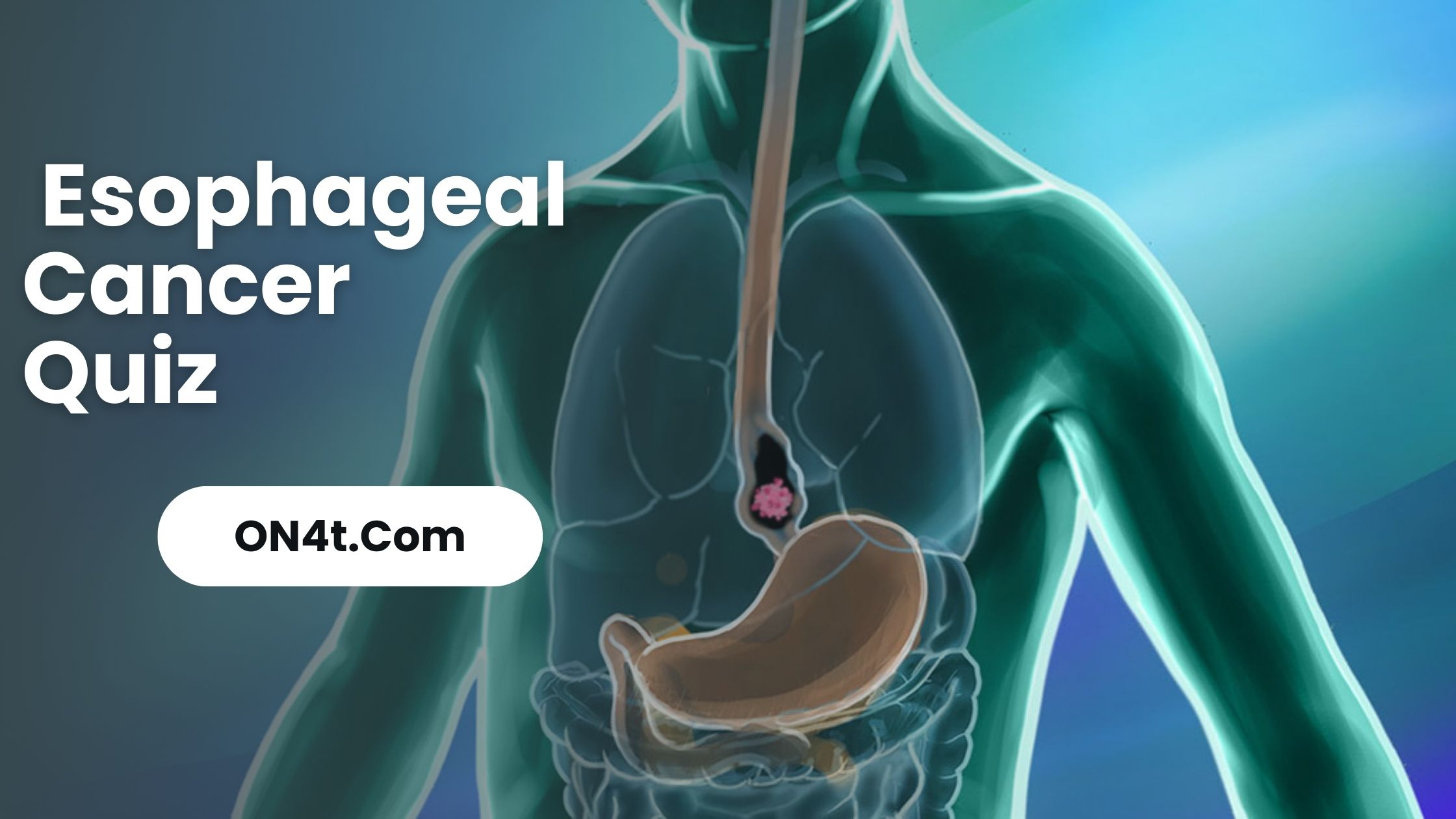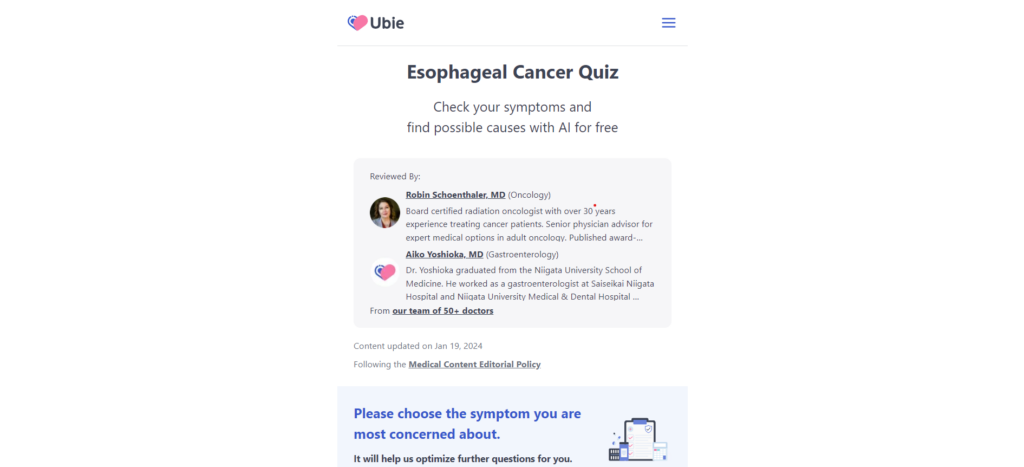Esophageal cancer is a serious disease affecting the food pipe that connects the throat to the stomach. Finding it early is key to successful treatment. If you have trouble swallowing, chest pain, or weight loss for no reason, taking an esophageal cancer quiz can help you decide if you should see a doctor.
This article has a quiz with multiple-choice questions about your risk factors and symptoms of esophageal cancer. It also answers common questions about the disease, its causes, signs, and tests and treatments available. The quiz is not a replacement for seeing a doctor, but it can help you choose if you need to get expert advice.
Exploring Do I Have Esophageal Cancer Quiz
If you are experiencing symptoms like difficulty swallowing, chest pain, or unexplained weight loss, you may be concerned about esophageal cancer. This serious condition affects the esophagus, which is the tube that carries food from your throat to your stomach.
Taking a “Do I Have Esophageal Cancer Quiz” can be a helpful first step in assessing your risk factors and determining whether you should seek professional medical advice.
The quiz typically consists of multiple-choice questions (MCQs) that cover various aspects of esophageal cancer, such as common symptoms, risk factors, and lifestyle habits. By answering these questions honestly, you can gain a better understanding of your overall risk and whether it’s time to consult with a healthcare provider.
Why is the Do I Have Esophageal Cancer Quiz A Must-Try?
Taking a “Do I Have Esophageal Cancer Quiz” is a must-try for several important reasons. Firstly, it can help with early detection. Esophageal cancer is often found late, when treatment options may be limited. By taking the quiz and identifying potential symptoms and risk factors early, you can get a timely medical evaluation, which is crucial for improving treatment outcomes and survival rates.

The quiz also raises awareness about esophageal cancer and its risk factors, like chronic acid reflux, smoking, and drinking too much alcohol. By answering questions about your lifestyle and health history, you can better understand how these factors may affect your risk of getting esophageal cancer.
Secondly, if the quiz results suggest an increased risk of esophageal cancer, it can strongly motivate you to seek professional medical advice. Early intervention and proper management are essential for improving the chances of successful treatment and maintaining a good quality of life. On the other hand, if the quiz results indicate a low risk of esophageal cancer, it can provide some peace of mind and help ease anxiety related to your symptoms.

Sample Do I Have Esophageal Cancer Quiz Questions And Answers
Do you experience difficulty swallowing (dysphagia)?
a) Yes
b) No
Have you recently lost weight unintentionally?
a) Yes
b) No
Do you often experience chest pain or pressure?
a) Yes
b) No
Do you have a history of chronic acid reflux or heartburn?
a) Yes
b) No
Do you smoke or have a history of smoking?
a) Yes
b) No
Do you consume alcohol excessively?
a) Yes
b) No
Have you been diagnosed with Barrett’s esophagus?
a) Yes
b) No
c) I don’t know
Answers:
1. a) Difficulty swallowing is a common symptom of esophageal cancer.
2. a) Unintentional weight loss can be a sign of esophageal cancer.
3. a) Chest pain or pressure may indicate the presence of esophageal cancer.
4. a) Chronic acid reflux or heartburn can increase the risk of developing esophageal cancer.
5. a) Smoking is a significant risk factor for esophageal cancer.
6. a) Excessive alcohol consumption can increase the risk of esophageal cancer.
7. a) Barrett’s esophagus is a precancerous condition that increases the risk of esophageal cancer.
Frequently Asked Questions (FAQs)
What Are The Risk Factors For Esophageal Cancer?
The main risk factors for esophageal cancer include chronic acid reflux (GERD), Barrett’s esophagus, smoking, excessive alcohol consumption, obesity, and a diet low in fruits and vegetables. Other factors, such as age (over 55), gender (male), and certain medical conditions like achalasia, may also increase the risk.
What Are The Early Warning Signs Of Esophageal Cancer?
Early warning signs of esophageal cancer may include difficulty swallowing (dysphagia), unintentional weight loss, chest pain or pressure, hoarseness, chronic cough, and indigestion or heartburn. However, these symptoms can also be caused by other conditions, so it’s essential to consult a healthcare professional for an accurate diagnosis.
How Is Esophageal Cancer Diagnosed?
Esophageal cancer is typically diagnosed through a combination of tests, including a barium swallow (an X-ray examination of the esophagus using a contrast liquid), endoscopy (a procedure that uses a thin, flexible tube with a camera to examine the inside of the esophagus), biopsy (removal of a small tissue sample for laboratory analysis), and imaging tests like CT, PET, or MRI scans to determine the extent of cancer and if it has spread to other parts of the body.
What Are The Treatment Options For Esophageal Cancer?
Treatment options for esophageal cancer depend on the stage of the disease, the patient’s overall health, and personal preferences. The main treatment options include surgery (removal of the cancerous portion of the esophagus and nearby lymph nodes), chemotherapy (use of drugs to kill cancer cells, often given before or after surgery), radiation therapy (use of high-energy beams to destroy cancer cells, often combined with chemotherapy), targeted therapy (use of medications that specifically target cancer cells, based on their genetic makeup), and immunotherapy (use of drugs that help the body’s immune system fight cancer cells).
Conclusion
Taking the “Do I Have Esophageal Cancer Quiz” is a simple way to assess your risk factors and symptoms related to this serious disease. By answering questions about your health, lifestyle, and any signs you may be experiencing, you can better understand if you should seek medical advice.
Remember, this quiz is not a substitute for a professional evaluation. If you have any concerning symptoms or risk factors, it’s essential to consult with a healthcare provider. They can perform necessary tests and provide an accurate diagnosis.
This article is super helpful in understanding the Esophageal Cancer Quiz. Plus, if you are into making excellent texts, the on4t font generator is a top choice to style up your words. It is simple, fun, and the best for adding that special touch to your texts or quizzes.